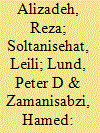|
|
|
Sort Order |
|
|
|
Items / Page
|
|
|
|
|
|
|
| Srl | Item |
| 1 |
ID:
171394


|
|
|
|
|
| Summary/Abstract |
Shifting from fossil to clean energy sources is a major global challenge, but in particular for those countries with substantial fossil-fuel reserves and economies depending on fossil-fuel exports. Here we introduce an improved framework for renewable energy planning and decision-making to help such countries to more effectively harness their abundant renewable energy resources. We use Iran as a case for the analysis. The framework includes identifying and removing barriers that prevent the use of renewables. It is based on combining two models: Benefit, Opportunity, Cost, Risk (BOCR) and Analytic Network Process (ANP) models. In the analyses, the mutual weight of strategic criteria is employed such as technology, economy, energy vulnerability, security, global effects, and human wellbeing. Using the integrated model, we find that solar energy would be the preferential renewable energy source for Iran. Also, the role of infrastructures, policies, and administrative structures in renewable energy to facilitate their development was analyzed. The renewable energy policy-making framework presented is applicable to other countries as well.
|
|
|
|
|
|
|
|
|
|
|
|
|
|
|
|
| 2 |
ID:
098211


|
|
|
|
|
| Publication |
2010.
|
| Summary/Abstract |
Energy use in Bangkok accounts for a large portion of the total energy consumption in Thailand. Few energy and carbon studies, however, have focused on the level of the city. International research indicates that cities are the key drivers of energy usage and the associated carbon emissions. This paper presents a study on the options for energy and carbon development for the city of Bangkok. The Long-range Energy Alternatives Planning System (LEAP) model is used to simulate a range of policy interventions and to predict how these would change energy and carbon development from 2000 to 2025. The planning period is assumed to start in 2005, and 2000 is used as the baseline year. Sustainability of the sixteen proposed policies and scenarios is analyzed using a multi-criteria decision-making approach. Results of this study provide an insight into Bangkok's energy and carbon future and highlight the steps required to promote a sustainable low-carbon society. The most significant energy savings are in the transport sector, where a modal shift from private passenger vehicles to mass transit systems has the potential to significantly reduce energy demand, carbon emissions, and local air pollutants.
|
|
|
|
|
|
|
|
|
|
|
|
|
|
|
|
| 3 |
ID:
098542


|
|
|
|
|
| Publication |
2010.
|
| Summary/Abstract |
Energy use in Bangkok accounts for a large portion of the total energy consumption in Thailand. Few energy and carbon studies, however, have focused on the level of the city. International research indicates that cities are the key drivers of energy usage and the associated carbon emissions. This paper presents a study on the options for energy and carbon development for the city of Bangkok. The Long-range Energy Alternatives Planning System (LEAP) model is used to simulate a range of policy interventions and to predict how these would change energy and carbon development from 2000 to 2025. The planning period is assumed to start in 2005, and 2000 is used as the baseline year. Sustainability of the sixteen proposed policies and scenarios is analyzed using a multi-criteria decision-making approach. Results of this study provide an insight into Bangkok's energy and carbon future and highlight the steps required to promote a sustainable low-carbon society. The most significant energy savings are in the transport sector, where a modal shift from private passenger vehicles to mass transit systems has the potential to significantly reduce energy demand, carbon emissions, and local air pollutants.
|
|
|
|
|
|
|
|
|
|
|
|
|
|
|
|
| 4 |
ID:
096112


|
|
|
|
|
| Publication |
2010.
|
| Summary/Abstract |
To reduce dependence on foreign sources of energy, address climate change, and improve environmental quality, the US government has established a goal of reducing petroleum fuel use in its federal agencies. To this end, the government requires its agencies to purchase alternative fuel vehicles, use alternative fuel, and adopt other strategies to reduce petroleum consumption. Compliance with these requirements, while important, creates challenges for federal fleet managers who oversee large, geographically dispersed fleets. In this study, a group of 25 experienced federal fleet managers participated in a pilot study using a structured methodology for developing strategies to comply with fleet requirements while using agency resources as efficiently as possible. Multi-criteria decision making (MCDM) methods were used to identify and quantify agency priorities in combination with a linear programming model to optimize the purchase of fleet vehicles. The method was successful in quantifying tradeoffs and decreasing the amount of time required to develop fleet management strategies. As such, it is recommended to federal agencies as a standard tool for the development of these strategies in the future.
|
|
|
|
|
|
|
|
|
|
|
|
|
|
|
|
|
|
|
|
|